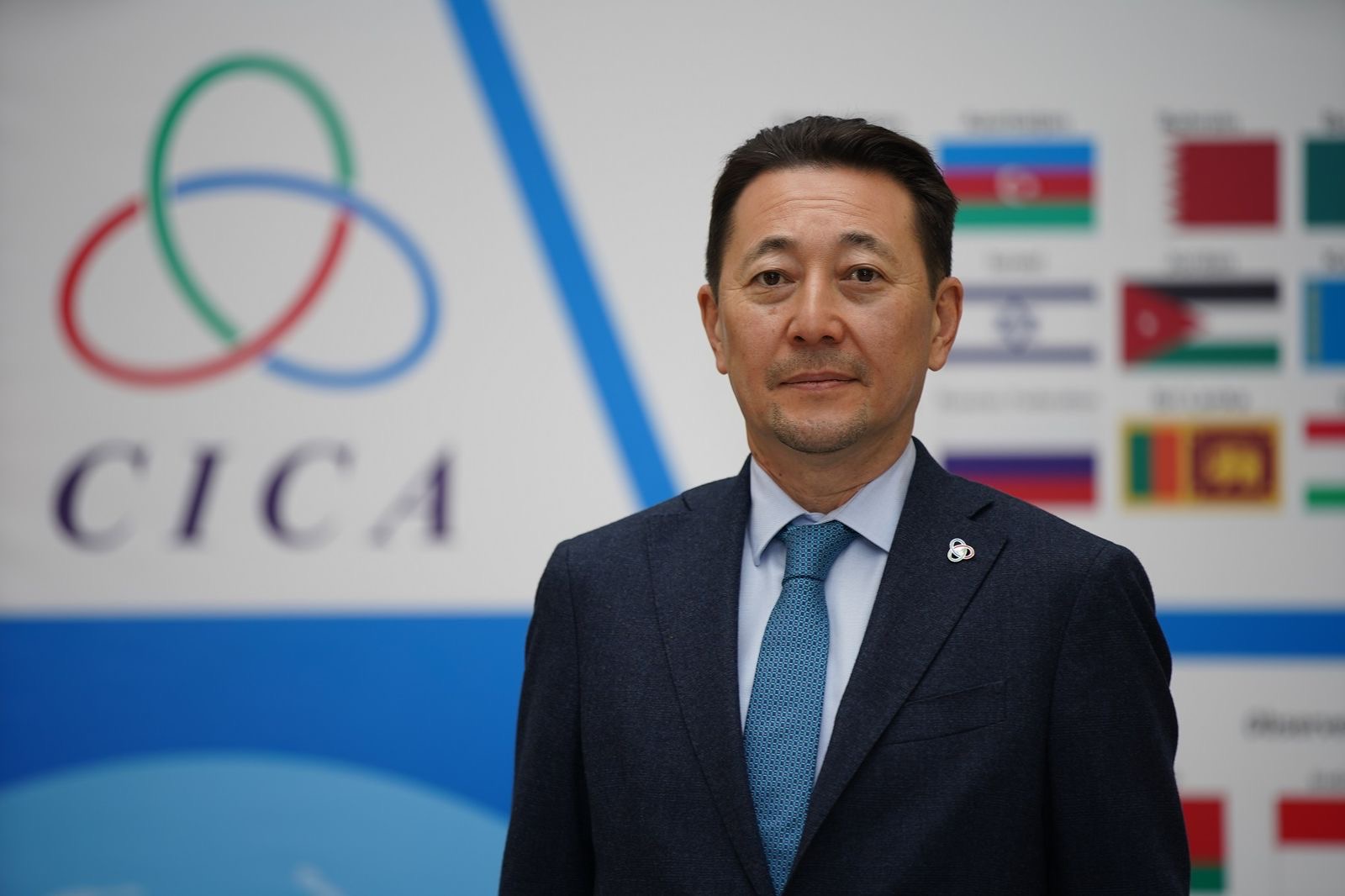By Aibarshyn Akhmetkali,Fatima Kemelova
Copyright astanatimes

ASTANA – As Asia moves from the periphery to the center of global affairs, the Conference on Interaction and Confidence Building Measures in Asia (CICA) holds the potential to act as a collective voice for the continent, said CICA Secretary General Kairat Sarybay in an interview with The Astana Times
Ahead of the Congress of Leaders of World and Traditional Religions on Sept. 17-18 in Astana, Sarybay discussed CICA’s unique mission of promoting security and cooperation across Asia, the ongoing efforts to transform CICA into an organization, and the long-term strategy that will guide its work over the next decade.
CICA’s distinctive role in Asian affairs
With many CICA members also part of leading Asian organizations such as the Association of Southeast Asian Nations (ASEAN), the Shanghai Cooperation Organization (SCO), and the Eurasian Economic Union (EAEU), the CICA positions itself uniquely through its inclusive and consensus-based nature.
Founded in 1992 as a forum to promote peace and security across Asia, CICA has grown to include 28 member states and 10 observer states.
“From the very beginning, the conference was conceived not as an exclusive club, but as an open, constructive platform where states of very different size, geography and political orientation can meet on equal footing. Its fundamental principles – consensus-based decision-making and voluntary participation in CICA activities – create a unique atmosphere that allows states, including those without diplomatic relations or mutual recognition, to sit together at the same table in dialogue,” said Sarybay.
“In this respect, CICA is not competing with other regional or subregional organizations. Its approach is to complement existing mechanisms and to build synergies with them,” he added.
CICA’s added value lies in providing an overarching pan-Asian platform that connects subregional experiences and reinforces cooperation across the continent. This philosophy is reflected in CICA’s partnerships.
Sarybay highlighted that the “CICA family” includes not only member states and observers but also numerous international and regional organizations.
“The United Nations is a central partner, with cooperation spanning areas from socio-economic development and counter-terrorism to migration management. Institutionalized relations also exist with the SCO and EAEU, while regular dialogue continues with the Economic Cooperation Organization, League of Arab States, Organization for Security and Co-operation in Europe, International Organization for Migration, TurkPA and others,” Sarybay said.
Charting the next ten years
The vision of CICA’s evolution should begin with an understanding of Asia’s growing role in world affairs, according to the CICA Secretary General.
“The region has moved from the periphery to the very center of global development. It is home to the fastest-growing economies, cutting-edge technologies and a significant share of the world’s population. Asia increasingly shapes models of growth and contributes to the rules of the emerging international order,” said Sarybay.
“In this context, the importance of platforms such as CICA will continue to increase. They provide an inclusive space where states with different political systems, cultures and traditions are able to engage in dialogue and work toward peace, stability and shared prosperity,” he added.
Cooperation can further expand in areas such as connectivity, sustainable growth, climate resilience and digital transformation.
“On the global stage, CICA holds potential to act as a collective voice of Asia – a forum where perspectives from across the continent are expressed in a balanced and constructive way. By developing partnerships with other regional and international organizations, CICA can ensure that Asia’s contribution to peace, security and development is more fully reflected in the global agenda,” said Sarybay.
The Congress of Leaders of World and Traditional Religions
Stability cannot be secured by political and military means alone if the moral and cultural foundations of society are neglected, according to Sarybay. This is where platforms such as the Congress of Leaders of World and Traditional Religions play a crucial role.
“The Congress of Leaders of World and Traditional Religions is, above all, a dialogue among spiritual leaders of different faiths and denominations, directed first and foremost toward peaceful coexistence. Its philosophy rests on the conviction that respect among people of diverse spiritual traditions is indispensable for harmony within societies and for the prevention of conflict,” said Sarybay.
“CICA pursues the same goal at the interstate level. Its guiding mission is to build confidence among member states, recognizing this as the foundation for peace and security in Asia. This vision is put into practice through the Catalogue of Confidence Building Measures – often described as a ‘menu of cooperation’ – which reflects the areas of joint work that Member States themselves have identified as the most relevant,” he said.
According to him, CICA and the congress act in parallel – one promoting respect and understanding among nations, the other among communities – both serving the common goal of peace and stability.
Steps towards transforming into a full-fledged organization
Under Kazakhstan’s chairmanship in 2020-2024, one of the CICA’s key achievements was the decision to transform the conference into a full-fledged organization.
The process of CICA’s transformation was launched at the sixth CICA summit in Astana in 2022, with the adoption of the Astana Statement on CICA Transformation. A few milestones down the road, CICA is taking decisive steps to implement that transformation in practice.
The first concrete result of this political decision was the adoption of the CICA Transformation Road Map in 2023. Another distinctive milestone followed when President Kassym-Jomart Tokayev approved the establishment of a dedicated CICA headquarters in Astana.
“This initiative carried historic significance, reflecting Kazakhstan’s role as the country that first proposed CICA more than three decades ago and has consistently supported its development. The inauguration of the headquarters took place on July 2, 2025, and symbolized confidence in the future of Asian cooperation, marking an important step in the institutional maturity of CICA,” said Sarybay.
Among other important decisions, Sarybay highlighted the Ministerial Council’s adoption of updated modalities for implementing Confidence Building Measures and Kazakhstan’s ratification of amendments to the Host Country Agreement, which clarifies the international status of secretariat personnel. The latter grants staff the status of international civil servants in line with international practice.
CICA’s further transformation
With the informal Ministerial Council Meeting in 2025 and the next CICA Summit in 2026 approaching, further steps in CICA’s transformation will be on the agenda.
At the informal ministerial council meeting in September in New York, the ministers will review the progress made in elaborating the CICA Charter and adopt decisions paving the way for the establishment of new advisory bodies, in particular, the Finance Summit, designed to advance cooperation among the financial sectors of CICA member states.
“The summit will foster dialogue on sustainable finance, cross-border investment, innovation and green growth, serving as a catalyst for stronger, more resilient and inclusive economies across Asia,” said Sarybay.
Another significant step will be the establishment of the CICA Women Council, an advisory body aimed at fostering dialogue, coordination, and exchange of experiences among member states in the field of women’s affairs.
“The council is envisaged to promote women’s empowerment, support the implementation of related CICA Confidence Building Measures, and encourage practical cooperation to strengthen gender equality and inclusive development across the region,” Sarybay said.
In 2024, Azerbaijan assumed the chairmanship of CICA for the 2024–2026 term.
“Looking further ahead, the CICA Summit in Baku in 2026 will be decisive. The culmination of these efforts is expected to be the adoption of the CICA Charter – a landmark achievement that will establish CICA as a full subject of international law,” said Sarybay.



